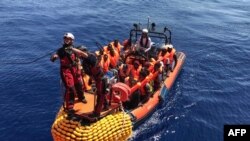In a joint statement, charities that operate Mediterranean Sea rescue vessels - SOS Mediterranee, Doctors Without Borders (MSF) and Sea-Watch - called Wednesday for the EU to resume search and rescue activities, saying they are overwhelmed and warning more people will die.
In a joint statement, they demanded that "European member and associated states provide an adequate state-led dedicated and proactive search and rescue fleet in the Central Mediterranean, and a fast and adequate response to all distress calls, as well as a predictable disembarkation mechanism of survivors".
The EU ended its controversial counter-people trafficking operation in the Mediterranean in 2020, replacing it with Operation Irini, which is focused on policing the UN arms embargo on Libya.
Rescuing migrants has since been left up to individual states, but NGOs complain that countries ignore distress calls or even work with Libyan authorities to send migrants back there.
The central Mediterranean is the world's deadliest migration route, with almost 20,000 deaths and disappearances since 2014, according to the International Organization for Migration (IOM).
MSF's ship Geo Barents is currently carrying 659 people including more than 150 minors, but despite requests to Italy and Malta they have yet to be given a port to disembark them.
Ocean Viking, run by SOS Mediterranee, on Sunday disembarked 387 people in the Italian port of Salerno, while the vessel Sea-Watch 3 disembarked 438 people in Taranto on Saturday, but only after days of waiting.
Italy has recorded more than 42,000 migrant landings this year so far -- up from almost 30,000 during the same period last year.
But there are calls here for tougher action to block the arrivals, notably from the hard-right parties expected to win power in September 25 elections.
Matteo Salvini, leader of the anti-immigration League party, is due on Thursday on the tiny island of Lampedusa, the landing point for many of the migrant boats.
The NGOs have been accused of creating a "pull factor" for migrants by providing a safety net in the Med, although they strongly dispute this.
"The removal of adequate and competent European search and rescue services in international waters off Libya has proven to be deadly and ineffective in preventing dangerous crossings," said Xavier Lauth, director of operation for SOS Mediterranee.
Charities including MSF have faced prosecution for their efforts in Italy, while their ships are regularly impounded for breaching safety rules.
In a case involving Sea-Watch, the European Court of Justice ruled this week that ports could not detain humanitarian ships for carrying more people than intended, emphasising the basic duty of helping those in distress at sea.
The Germany-based group hailed the ruling, saying: "In the future, ships will thus continue to do what they do best: Rescue people instead of being arbitrarily stuck in port."
